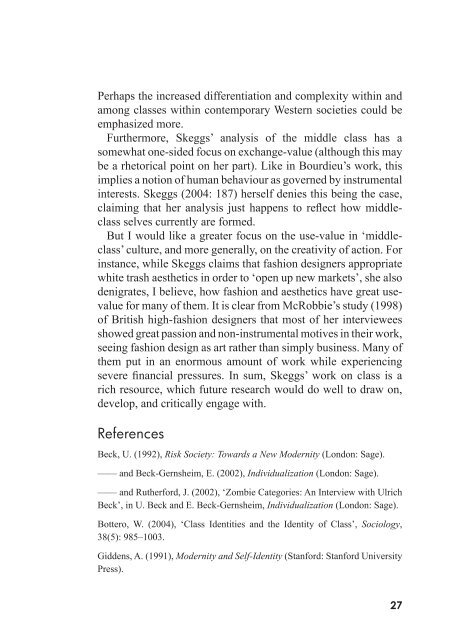Thinking with Bevereley Skeggs - Stockholms universitet
Thinking with Bevereley Skeggs - Stockholms universitet
Thinking with Bevereley Skeggs - Stockholms universitet
- No tags were found...
Create successful ePaper yourself
Turn your PDF publications into a flip-book with our unique Google optimized e-Paper software.
Perhaps the increased differentiation and complexity <strong>with</strong>in andamong classes <strong>with</strong>in contemporary Western societies could beemphasized more.Furthermore, <strong>Skeggs</strong>’ analysis of the middle class has asomewhat one-sided focus on exchange-value (although this maybe a rhetorical point on her part). Like in Bourdieu’s work, thisimplies a notion of human behaviour as governed by instrumentalinterests. <strong>Skeggs</strong> (2004: 187) herself denies this being the case,claiming that her analysis just happens to reflect how middleclassselves currently are formed.But I would like a greater focus on the use-value in ‘middleclass’culture, and more generally, on the creativity of action. Forinstance, while <strong>Skeggs</strong> claims that fashion designers appropriatewhite trash aesthetics in order to ‘open up new markets’, she alsodenigrates, I believe, how fashion and aesthetics have great usevaluefor many of them. It is clear from McRobbie’s study (1998)of British high-fashion designers that most of her intervieweesshowed great passion and non-instrumental motives in their work,seeing fashion design as art rather than simply business. Many ofthem put in an enormous amount of work while experiencingsevere financial pressures. In sum, <strong>Skeggs</strong>’ work on class is arich resource, which future research would do well to draw on,develop, and critically engage <strong>with</strong>.ReferencesBeck, U. (1992), Risk Society: Towards a New Modernity (London: Sage).—— and Beck-Gernsheim, E. (2002), Individualization (London: Sage).—— and Rutherford, J. (2002), ‘Zombie Categories: An Interview <strong>with</strong> UlrichBeck’, in U. Beck and E. Beck-Gernsheim, Individualization (London: Sage).Bottero, W. (2004), ‘Class Identities and the Identity of Class’, Sociology,38(5): 985–1003.Giddens, A. (1991), Modernity and Self-Identity (Stanford: Stanford UniversityPress).27
















